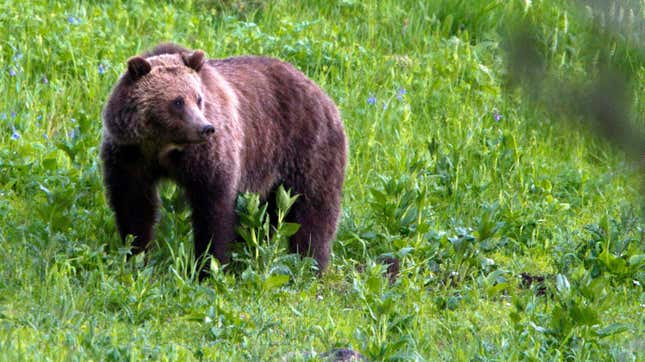
Earlier this month, hikers discovered the body of a 154-pound (70-kilogram) grizzly bear near Burgess Pass in the Canadian Rockies. Unbelievably, an autopsy by Parks Canada found the bear had been killed by a mountain goat. Even more unbelievably, my colleagues on the Gizmodo science team celebrated this, calling the goat a “badass.”
To which I say, have you no heart, Gizmodo science team? I’m here to stand up for the grizzly bear. That goat is no badass. It’s a stone-cold accomplice to murder, working with climate change to claim the life of an innocent grizzly bear.
The climate crisis has wreaked havoc on the region near where the bear was found. You might remember the wildfires that ripped through Canada over the summer. A blaze burned down an entire town and historic lightning storm ignited hundreds of fires across western Canada, including ones so intense that they turned day into night. Two of the fires engulfed parts of Banff National Park. Banff sits literally across the road from Yoho National Park, home to the scene of the goat-on-bear crime.
Ladies and gentlemen of the jury, allow me to remind you that climate change is making hot weather that fuels wildfires more common. And may I also point out that these more intense fires burn everything in their path. So what does this have to do with bear murder?
In Yoho National Park, bears rely heavily on vegetation to fatten up for the winter. Unlike coastal brown and black bears, these grizzlies don’t have access to salmon. According to Parks Canada, meat makes up just 15% of their diets. Berries, in particular, are a primary source of food for grizzlies in the summer. Wild berry patches are resilient and can grow back soon after a wildfire hits. But once they’re incinerated by flames or dried out by drought, there’s not much there for bears to pick over.
“This year, we had a poor berry crop and that is typically the caloric event of the season,” David Laskin, a wildlife ecologist with the Parks Canada Lake Louise, Yoho and Kootenay field unit, told Calgary’s CTV News, noting that the bears “often move to different food types, they’ll dig roots and look for ungulates to prey on.”
In other words, this goat was not a badass; it was a gruesome murderer who chose to harm a helpless creature suffering due to climate change. Research by scientists at the University of Alberta and University of Calgary found that the growing season for buffaloberries—tart red berries that grizzlies love—is getting shorter due to climate change-fueled heat and dryness. In other words, these bears facing more summers like this one.
Yes, the bear may have gone after the goat first, but can you blame the poor thing? With no berries around, it was probably desperately hungry and worried it wouldn’t survive the winter. After all, the bear carcass weighed roughly 154 pounds, which is slightly smaller than an average adult grizzly bear.
Sounds to me like this animal may have been in distress. For all we know, it may just have wanted a small nibble of mountain goat. Perhaps our dearly departed bear had the intent to maim but not kill. Yet it was met with an act of ungulate escalation. Gizmodo’s science team called its death an “amusement,” but this is deadly serious. This is bear murder. Clearing this bear’s name and getting the vile mountain goat that killed it ruled guilty in the court of public opinion is the least we can do. I rest my case.